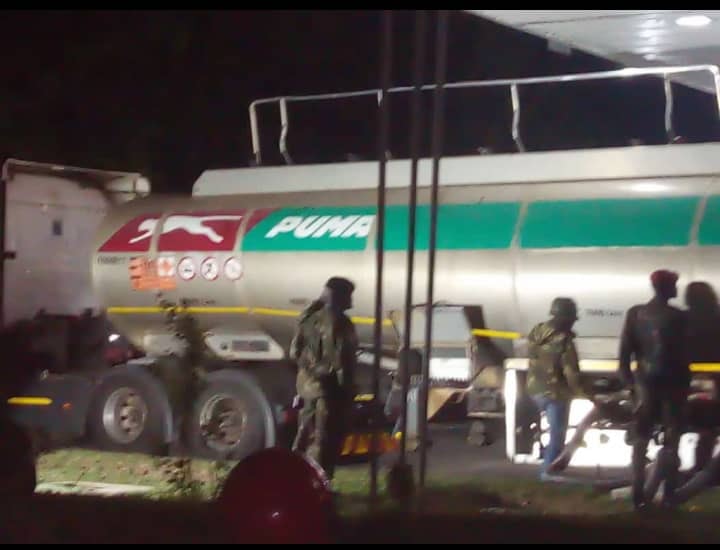Panic as fuel pumps run dry
Motorists on Thursday felt the impact of the truck drivers’ strike as service stations run out of fuel, especially petrol, due to disruption in the supply network paralysed by the industrial action.
The hardest-hit areas were the major cities of Blantyre, Lilongwe and Mzuzu where some motorists were forced to drive to the nearest remote trading centres to source fuel.

Motorist Sydney Kaunda said he was forced to park his car at Ginnery Corner in Blantyre after running out of fuel.
In some cases, service stations were forced to ration the quantities one motorist could buy.
During a spot-check around 4.30pm, Cassim Banda, a manager at Petroda Service Station at the Clock Tower in Blantyre, said he had over 40 motorists in the queue to be served, but the station had about 600 litres.
He said the situation forced the service station to ration by selling four litres to each motorist.

In Mzuzu, taxi operator at Harry Katoto Rank, Edgar Chavula, said almost 90 percent of the operators in the city had parked their cars due to fuel shortage.
In Lilongwe, motorists also faced similar problems as only a few service stations had the commodity. By evening, Puma Area 18 Service Station was taking delivery under the watchful eyes of Malawi Defence Force (MDF) soldiers who escorted the tanker.
In an interview on Thursday Malawi Energy Regulatory Authority (Mera) consumer affairs and public relations manager Fitina Khonje called for calm.
She said panic buying could only lead to depletion of fuel reserves if not controlled.

Said Khonje: “The regulator is working with industry players to ensure that fuel is delivered from reserve storage to various retail facilities. The operation can take hours to be implemented.”
She said following the situation, Mera engaged services of an emergency committee as espoused in the Liquid Fuels and Gas Emergency Policy of 2019 to find a solution to the problem.
Khonje said: “We still have lots of fuel in the country, but our challenge is on moving this to retail stations. With people panic buying fuel, it means they are buying more than what they should.”
Minister of Information Gospel Kazako has since said government has engaged MDF to provide escort to fuel tankers to service stations to ensure unrestrained supply of fuel.
The government’s decision came barely 24 hours after Mera assured the nation on Wednesday that the country had adequate supplies of fuel. By then, spot-checks in Blantyre and Lilongwe showed that motorirts were queuing for what is now becoming a scarce commodity.
Briefing journalists in Lilongwe on Thursday , Kazako echoed Mera’s position that the country has enough stocks.
He said: “This is a security issue. It is a national security issue that is why we have engaged the Malawi Defence Force to ensure flow of fuel into the country.
“We should not allow a group of people to hold about 19 million people to ransom.”
In their bid to push for improved pay packages, the truck drivers from Sunday have been blocking even non-members of their unions such as institutional heavy goods vehicle drivers from proceeding with their deliveries. In some cases, trucks found on the road were forced to park and had their tyres deflated.
Kazako wondered why the truck drivers were on strike when government resolved the grievances they presented.
The drivers demanded a waiver on Covid-19 testing fee which Ministry of Health has since implemented.
They also pushed for passport renewal fee reduction and review of the processing of special driving examinations for the drivers which Kazako said government has implemented.
Kazako warned the private sector truck drivers that the Malawi Government has the capacity to buy trucks and tankers and manage businesses on its own, but does not want to control everything; hence, it gives contracts to the private sector.
But Professinal Drivers Union chairperson Major Mkandawire said government was yet to communicate to them on the addressed grievances.
He also alleged that police assaulted and arrested some of their members.
In an interview on Thursday , National Police spokesperson James Kadadzera confirmed that some drivers were arrested, but could not give more details.
The driver s want government to enforce a K140 000 minimum salary and also ensure that local transporters enjoy government contracts.
In a separate interview, Road Transporters Association of Malawi chief executive officer Christie Flao said the situation has affected businesses.
She said: “Everything is at a standstill. We are losing business every day since the standoff of the drivers. Transport is the lifeblood of every economy. The situation is critical.”
Economist Milward Tobias, who is also executive director of Centre for Research and Consultancy, also warned that the already shaky economy would further slow down if the fuel shortage persists.
He said: “What is even more disturbing is that the cause of the crisis is the inability of leadership to resolve the issues truck drivers presented a long time back. The issues are not new.”
In his reaction, Consumers Association of Malawi executive director John Kapito said they are concerned with the situation and called on the government to quickly address truck drivers’ concerns.
“The situation will lead to consumers being deprived of their basic necessities. Our leaders need to listen and act quickly,” he said.
Transporters Association of Malawi on Wednesday endorsed the strike, saying government should improve the haulage rates paid to transporters to enable them pay the drivers the demanded packages.
Malawi last experienced the worst fuel shortages between 2011 and 2012 under the Bingu wa Mutharika administration.
At the time, the country had low foreign exchange reserves and the fuel Price Stabilisation Fund (PSF) was depleted. Currently, the PSF is projected at about K1.5 billion against the recommended minimum of K5 billion, according to Mera. n
—Additional reporting by GEORGE SINGINI, JONATHAN PASUNGWI and DUMBANI MZALE,





